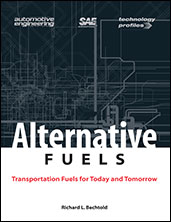Book

Alternative Fuels
2002-09-15
With the vitality and economic growth of the U.S. being linked to affordable transportation, the use of alternative fuels is beginning to play a larger role. The use "alternative fuel" has been used to describe any fuel suggested for use in transportation vehicles other than gasoline or diesel. Since 1998, more than half of the petroleum the U.S. economy requires has been supplied by imports. In addition, the climatological and scientific community has warned that increasing concentrations of greenhouse gases in the atmosphere will cause global change. Alternative Fuels examines the accepted alternative fuels, providing historical background, physical and chemical properties, production technology, and forecasts for each fuel. Alternative transportation fuels addressed include: methanol, ethanol, propane, natural gas, biodiesel, hydrogen, and electricity. Chapters include: The Argument for Alternative Fuels Methanol Ethanol Propane Natural Gas Electricity and more

